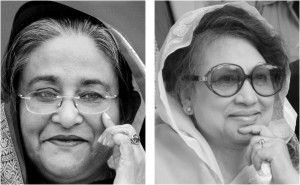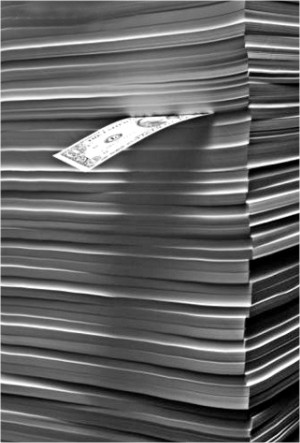
Democracy of the powerful, by the rich and for the vested interest
Syed Munir Khasru
 |
Photo: Star |
[Excerpts: We, Bangladeshis, forgive naively and forget easily. Otherwise even four decades after the war of liberation we still would not be struggling to try the war criminals, nor would we be again opting the path of confrontational politics when the recent past has shown where it can lead to. For a nation, emotionally so volatile, it indeed is a challenge to ensure the geo-political stability and socio-economic equilibrium needed to achieve the kind of future that our founding fathers had envisioned when we emerged in the global map red and green. Shall and will we give the next generation a fair chance ? That is the most important question that the nation needs to answer today.]
As Daily Star celebrates 20th year of its journey, Bangladesh is completing 40 years of its birth as a nation. In the 40th year of Bangladesh's existence, Daily Star looks like the mid-life child of a nation that has sacrificed so much for freedom of speech and democracy. While the child has been growing from strength to strength and claiming its rightful place as the most well read and widely circulated English daily of the country, it is time for somber reflection as to what has been happening to the mother land which has given us the opportunity to be whatever we are today. Hence, let us have a look at the period during which the Daily Star has soared to newer heights of success and what we as a nation have able to achieve during the same time.
Democracy & Leadership: While we take pride in identifying ourselves as a moderate Muslim democratic state, our democratic performance remains weak. There are very few nations who love democracy as much as they suffer for it as well. In 1991, when the jubilant crowd was thronging streets of Dhaka in celebration of fall of an unpopular autocrat, everybody was thinking of finally arriving to that moment the moment of rebirth of a nation through establishment of a democratic system of governance which fulfills the positive aspirations of the citizenry. In the festive streets of Dhaka, had any Nostrodamus predicted in 1991 what 2011 was holding for us, then he probably would have been disdainfully dumped by people so passionately optimistic about the future at that time. As fate would have it, we seem to be perennially on the wrong side of the aisle.
Since passing of two decades of restoration of parliamentary democracy, today as a nation we stand more divided than we were able to be united against the autocratic regime. If there is any winner in this whole political spectrum, it is the befallen military dictator who today triumphs being elected in the Parliament from as many constituencies as are both the Prime Minister and the Leader of the Opposition. From being in a position when he had to consider either to go in exile or to face incarceration, today he is as free a citizen as any of us is and enjoys no less media coverage, diplomatic recognition, political clout than any of the major political parties after the big two parties. He has prevailed and so have the practices which were meant to oust an usurper cum corrupt dictator and not to make the hard earned democracy dysfunctional hartal, intolerance, street violence, picketing, riots, and civil disorder. In other words, we have retained the negatives of the era of dictatorship and failed to initiate the positives that a functional democratic system is supposed to yield. What a pity.
Our two leaders are as distant as they ever have been and rivalry is so bitter that even the traditional wisdom of “misery makes enemies friends” also has been proven wrong. Many thought that the so called “Minus Two Formula” and subsequent arrests of the two leaders in the aftermath of the much talked about 1/11 would bring them closer as both were facing similar plights. May be common sufferings would have finally paved way for some degree of empathy and understanding between the two. Alas! our tryst with fate is so fateful that nothing seems to work as far as bringing these two leaders together is concerned. Neither national appeal nor international mediation, neither vital national interests nor common personal sufferings, neither democratic aspirations nor their iron handed leadership styles nothing seems to work to make them find minimum common ground. We are again hitting the cross roads where the roads chosen by our two leaders never cross each other as the nation is left helplessly stuck in the middle as it has been during the last two decades.
 |
Photo: Comstock Images |
The history of two-thirds majority in South Asian parliamentary democracies has been more of a disaster than of a period of economic development and good governance led by elected governments with strong popular mandate. Whether Indira Gandhi or Benazir Bhutto or Newaz Sharif all have performed worse under two-third majority and each was ousted ignominiously compared to periods of rule by simple majority. Whether well established democracy like India or countries with weak democratic credentials like Pakistan none have done well when empowered by two-third majorities. Instead of using the popular mandate as an empowerment to perform better, each regime betrayed public trust by misusing the mandate for autocratic behavior, personal gains, corruption, and poor governance. In case of Bangladesh, BNP messed it up grandly in its 2nd term with two-third majority even though not entirely its own but with the alliance together. Corruption, mismanagement, and poor governance have today relegated BNP to an opposition with lowest number of seats of the four parliaments we have had since 1991. Hence, if anybody is apprehensive about how the current government may end up its term with a two-thirds majority of its own then none can really blame him/her for that note of skepticism. Let's keep our fingers crossed and see what the future holds for us.
Governance and Corruption: We are tired of the pretension of ignorance on corruption by whichever party is in power. We don't need TIB to tell us how much corrupt we are. Whether it big time scam in infrastructure projects by some well known faces to our difficulty in dealing with many of the government offices corruption continues to be a part of life. After the upheavals of 1/11 and resulting arrests and other forms of action by then caretaker government, the common expectation was that if nothing else, it will serve as a wake up call for many unscrupulous businessmen and politicians. Other than some cosmetic changes, nothing significantly has changed as those on the run have regained their original position. There is a saying, “what does not kill you, makes you stronger.” So from the most notorious land grabber cum murder suspect of the country to the villains of share market scam of late nineties all have resurfaced with new vigor. From our Mr. China, who in the process of making money represents Chinese interest even better than the Chinese government does, to some of the ruling party men who are grabbing tender the story is not significantly different than what we are used to seeing.
In the middle of this orgy of this power abuse and illegal money, there are beacons of hope in people like the Agriculture Minister, the Finance Minister, and the Education Minister who are known for their honesty and competency a difficult combination to find in this land. The Public Procurement Regulations (PPR) has lost its teeth with the controversial and questionable changes that have been made under duress from the vested quarter. Hence, recent advertisement and promotion of PPR by the government in the media has very little of either appeal or credibility. When will the politicians ever realize that we, the people, are not as naïve as they would like to believe. If the Prime Minister would have set at least one example whereby she has fired a Minister for corruption, then the act in itself would have sent a powerful message, both nationally and internationally. The intelligence community is supposed to have been keeping her updated on activities of her cabinet colleagues and we sincerely hope that she will act decisively and firmly before the rot spills further during her 2nd term in power.
It seems that perceptually, the period of relatively less corruption was BNP's 1st term in power and since then we have been sliding downwards with every elected government and corruption peaking during the 2nd term of BNP's rule when almost everything and anything seemed to be up for grabs. Then we had the 1/11 followed by what is widely accepted as a free and fair election with an elected government with overwhelming majority. If even now we can't turn the tide against corruption, when we ever will ? Our appeal to the politicians and bureaucrats - please talk and sermonise less and practice what you preach.
Elections and Judiciary: Under normal circumstances, one would wonder why a columnist is bracketing two such distinct and unrelated areas like Elections and Judiciary under the same caption. Well, that explains the fundamental problem we have as a nation. No matter how well devised a mechanism we choose for greater benefit of the people and country, in our inner lust for power and personal interest, in the end we manage to mess it up grandly and do more harm the originally intended good.
In our bid to ensure fair elections, the institution damaged most is the judiciary. As very correctly observed by Justice Matin, the recently retired Judge of the Appellate Division, unthinkable harm has been done to the judiciary through incorporation of the provision in constitution which makes the immediate retired Chief Justice the 1st choice for heading the caretaker government. It is now an open secret how the ruling parties orchestrate the judiciary, particularly the Appellate Division, to have their preferred people head the CTG. The worst victim of this manipulation is the loss of faith of ordinary people in the inherent integrity, competency, professionalism, and fairness that this revered institution of the country is supposed to command.
 |
Photo: Yuji Sakai |
Just as appointment of judges has become political, in many instances some of the verdicts also has become controversial. A judge can enjoy confidence of the ruling party, but once a judge - s/he is no longer loyal to anyone other than the constitution and bound by the solemn oath to deliver justice. When a sitting high court judge makes political statements in public forum what kind of confidence people are supposed to have on the judiciary?
Given what has happened last time when AL did not accept the immediate retired CJ as the head of CTG, it is quite predictable how BNP will react when time comes around for next elections and the current CJ is supposed to be heading the CTG. If confidence building measures are not initiated now by the government by having talks with the opposition on this key issue of elections, we may very well be heading for something which at this point of time most of us don't even want to imagine.
Economy and Business: In the middle of the dark clouds looming for the last two decades, if there are some silver linings, it is the amazingly resilient business community that Bangladesh is blessed with. Except some rotten eggs making money through either unscrupulous commission or robbing banks , the genuine entrepreneurs have been working day and night energizing the economy, making exports on time, creating employment, beating hartals, and keeping the country going. The story would be incomplete, if we do not salute the ordinary people doing extraordinary feat. From the underpaid garment workers toiling in the factory floor to meet deadlines to the unskilled labor sweating under the scorching heat of Middle Eastern sun these are the unsung heroes who boost our foreign exchange reserve and balance of payment without even knowing how their small acts are having such a profound effect on the economy.
A part of the so called business elite, do not hesitate buying their 5th 4WD luxury vehicle but shrink to raise the salary of RMG workers even by few hundred bucks. While the foreign exchange reserve is critically dependent on the remittance inflow generated by these poorly educated workers, we don't want them to occupy our next seat while traveling in the same aircraft. Unless we have inherent fairness on how we treat these people who in many ways are doing the country more favor than what the country has been able to offer them then the day of reckoning will not be too far away. If we could achieve three milestones a business community that not only is competent but also ethical, a working class given its due share and respect, and a political culture that inspires confidence and continuity then the double digit growth that is talked about would finally happen beyond just seminar talks, economic reviews, and lofty projections of frivolous talk shows.
The Future: After our eventful journey in democracy in the last two decades, we are at a delicate crossroad. Depending on how our political leaders navigate the ship, we can either sail towards the direction of achieving a sustainable and functional democratic system that propels economic growth and development. Or we can continue to drift in unchartered territories through our reckless decisions and irresponsible acts. Either in the overconfidence of two-third majority or in the desperation of regaining power - it would be unwise to so quickly forget lessons of the recent past. Unfortunately, the biggest lesson of Bangladesh history is that nobody cares to learn from history.
We, Bangladeshis, forgive naively and forget easily. Otherwise even four decades after the war of liberation we still would not be struggling to try the war criminals, nor would we be again opting the path of confrontational politics and intolerance when the recent past has shown where it can lead to. For a nation, emotionally so volatile and naturally so fragile, it indeed is a challenge to ensure the geo-political stability and socio-economic equilibrium needed to achieve the kind of future that our founding fathers had envisioned when we emerged in the global map red and green. It is the same nation which cherishes a language emboldened by the martyrs' blood, owns a country created through untold sufferings and countless acts of bravery, and holds a younger generation whose talent would unleash the future we dream of.
Shall and will we give the next generation a fair chance ? That is the most important question that the nation needs to answer today.
The author is a Professor at the Institute of Business Administration (IBA), University of Dhaka